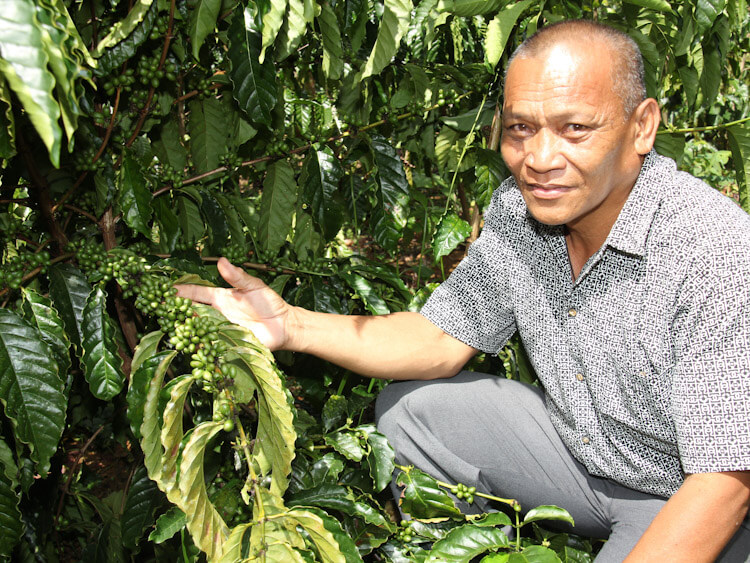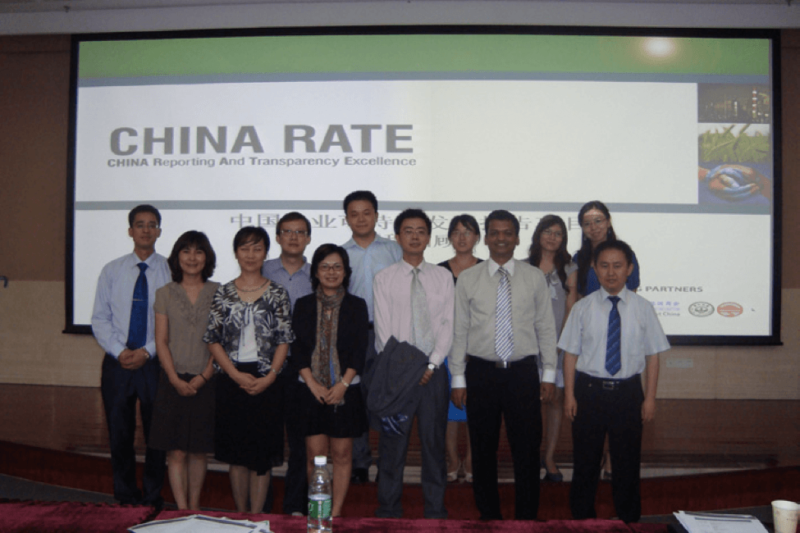
Coffee production in the Philippines has been dwindling for the past 20 years albeit the increasing consumer demand. Driven by the rising consumption in emerging economies, as well as shifting preferences in established consumer markets, ASSIST together with Nestle and DEG, implemented CoFFEE – a project that aims to help smallholder coffee farmers boost production through the acquisition of new technologies on coffee farming.
Capitalizing on strategic geographies characterized by fertile plains, rolling terrain and hilly mountains, the project supplements the effort through promoting proper crop nutrition and integrated crop management (ICM) along with new fertilizer types in order to ensure quality produce. Strengthening farmers’ overall farm management capacity was also key to maximizing adopted technology. Trainings on farm budget and management, utilization of portable drying facilities, as well as transport of green coffee beans to buying stations were key knowledge sharing activities.
As a result, intensive training on key topics such as Nursery Establishment, Care & Maintenance and Plantation Establishment were given to the farmers. Part of the Training of Trainers (ToT) program also included hands-on training on coffee growing methods & technologies in Nestle´ Coffee Plantlet Production and Training Center (NCPPTC). 30,000 seedlings were distributed to be planted in the 25 hectare demo farm which also houses existing coffee trees.
ProGED – Promotion of Green Economic Development is an initiative with the objective of helping micro, small and medium enterprises, as well as government institutions contribute to the economic development, increase awareness and gain knowledge on how to implement environmentally friendly, “climate-smart” and inclusive strategies in the tourism sector of the Philippines.
Funded by GIZ, ProGED focused on the tourism sector due to its high potential for investment and employment. ASSIST performed a series of training on Green Economic Development (GED); conducted a technical session on “Greening MSME Operations”; delivered two training modules: ‘Greening Strategies and Quantitative Benefits’ and ‘Consumption and Cost Monitoring’ and; provided experts and consultations for training delivery.
China is one of the world’s largest emitters of greenhouse gases (GHGs) and a significant contributor to global warming, owing to the rapid growth of the industrial sector. Energy efficiency measures can help in reducing air pollution and generate economic benefits—thus, making it attractive to investors and energy consumers. Creating a better basis for increasing energy efficiency would help the Chinese government meet its 2020 commitment of advancing a more environment-friendly economy.
ASSIST, together with TUV Nord and DEG, developed the ACE initiative with the aim to contribute to advancing a carbon-neutral economy. The project targeted energy-intensive enterprises in four cities in China – namely Shanghai, Tianjin, Guangzhou, and Chongqing. These four locations are among the top most industrialized cities in the country, where resource-intensive industries are concentrated.
To achieve this, the key interventions include 1) conducting a multistakeholder forum; 2) creating an awareness session to highlight the alarming levels of carbon emissions in China and the practices that companies can adopt to curb this amount; 3) developing an online assessment tool for carbon footprint calculation; 4) developing training materials; 5) conducting a Train-the-Trainer workshop; 6) identifying at least 5 carbon-intensive companies and providing technical assistance to become a Carbon Neutral Company; 7) developing a case study report and; 8) conducting a best practices forum.
The development of a Situation Analysis (SitAn) of Children’s Well Being is a key part of UNICEF’s international mandate for strengthening evidence-based policy planning and decision-making to promote human development and the fulfillment of children’s rights. In the specific context of Ho Chi Minh City in Vietnam, the SitAn would be of great importance for identifying the gaps in child rights implementation and priorities for children to inform evidence-based planning and budgeting for children through the city’s socio-economic development plan (SEDP).
To develop the SitAn, ASSIST collected primary and secondary information from provinces in Ho Chi Minh City, and data mining from existing data/information sources, including stakeholder consultations. Consultations were undertaken with key stakeholders, including children, in Ho Chi Minh City before a final SitAn report was submitted to UNICEF.
The collected lessons learned and good practices of Ho Chi Minh City on child care and social protection will be used for possible replication in other provinces in Vietnam. Likewise, the SitAn will lay the groundwork for HCMC’s application of the Child-Friendly City approach in the coming years.
As part of the initiative to develop H&M’s “Green Industry” strategy for the garment supply chains of Cambodia & Myanmar, ASSIST conducted a mapping of the existing stakeholders on renewable energy.
ASSIST conducted mapping studies and generated reports on solid waste, renewable energy, and water saving technologies. The reports provided a description of the subject’s current conditions in the country, the existing stakeholders and key players and the national solutions/technologies available. The reports also offer a more detailed analysis of the subject specifically in the context of the country’s garment industry and recommend relevant actions for the sector. Following those 6 reports (3 in Cambodia, 3 in Myanmar), H&M requested ASSIST replicate the studies in Vietnam.
Sugarcane farming is one of the most important segments in Indian agriculture. Over 50 million growers find livelihood through this crop supplying to the sugar industry, for which India ranks 2nd in the world economy. Maharashtra, the largest sugarcane belt in the country, suffers from unpredictable monsoons as well as low farmer yields (80T/HA), which can be largely attributed to unsustainable farming practices such as poor irrigation, lack of proper care for the soil, use of manual labor and related costs. However, over one-third of the yield comes from medium hold sugarcane farmers, indicating that building their capacity on sustainable practices and smart mechanization will work wonders to increase the overall yield of sugarcane.
ASSIST, SDF and DEG have partnered to implement Smart 4 Green – a structured project meant to sensitize sugarcane farmers on good agricultural practices, packaged into a practical and sustainable guide and coupled with a level of mechanization, that can help enhance the sugarcane farming sector and revive livelihood in these areas. The key objectives of the project are increasing awareness on 4 feet sugarcane plantation methods, upgrading farmer capacity on sustainable farming and smart mechanization, value chain enhancement through dealer training and ensuring the presence of continued support for farmers.
This project aims to support sugarcane farmers in the adoption of sustainable practices and smart mechanization through numerous interventions and partnerships with local academic institutions, government agencies, and financial service providers. A Farmer Help Centre for sugarcane farmers will be set up to provide continuous support and consultation. Pilot demonstration farms using the improved operations will be established, closely monitored and showcased for the sugarcane farmers who will also be undergoing training sessions. By the end of this project, sugarcane farmers in Maharashtra will understand the benefit and utilize advanced farming practices and mechanization, strengthening India’s sugarcane value chain and the overall agricultural sector.
Current patterns of energy consumption will lead to increased demand for thermal energy by almost 700% by 2050 when compared to 2005 levels. At the same time, the number of buildings is expected to manifold by 40% which contribute significantly to the increased energy usage. In order to minimize the energy use, we need to maximize the savings by implementing a sustainable Building Management System (BMS) in buildings, which will better manage as well as improve energy usage and performance, through the use of hardware, information, and data.
To achieve these objectives, the project focuses on creating awareness among business owners and decision makers about the importance of sustainable BMS implementation; attempts to enhance capacity among local facility technicians through establishment of state-of-the-art BMS training facility and up-skilling through targeted trainings; and implements pilots as showcases for sustainable BMS at prominent buildings in varied sectors to strengthen awareness.
Currently, CII-GBC, the home of Indian Green Building Council (IGBC) hosts one pilot solution while another IT company in Chennai called Aspire Systems hosts the second pilot – exhibiting significant savings and GHG reduction through a strong BMS solution. Furthermore, the training centre has been established at and in partnership with Dr. Ambedkar Institute of Productivity (AIP) – National Productivity Council (NPC), Chennai, a prestigious central government institute under the Ministry of Industry & Commerce, Government of India – paving way for practical learning, sustained operations and affordable up-skilling among technicians.

China is among the top three countries in the world with regards to the size of its economy and success of its business. When it comes to the quality of services and products, Chinese organizations are considered world class. However, up to date one aspect of conducting business has not reached wide popularity, namely corporate sustainability reporting. The project China RATE sought to initiate the spread of corporate social and environmental reporting amongst manufacturing and service industries in China. It hoped to raise awareness and optimize the reporting procedures of Chinese companies to make their businesses more sustainable. By training organizations on issues such as transparency, environmental responsibility and international GRI guidelines, it aimed to enable them to create a better long-term approach which would lead to greater success and profits.
ASSIST, in partnership with TUV Rheinland, conducted awareness raising sessions with company CEOs, trained local companies on GRI guidelines and provided technical consultancy to selected companies on GRI implementation. The awareness raising activities targeted top decision makers to ensure company commitment to corporate sustainability reporting. Fifty participants from different companies in China attended a series of training on GRI standards, international and local standards as well as on local carbon strategies. These trainings built the local capacity of these participants to become trainers themselves and spread their knowledge among industry partners. Finally, the project gave five companies intensive consultancy on GRI guidelines and helped them with their sustainability reporting.
Global Initiatives organizes annual forums on responsible business and in 2015 held the Responsible Business Forum on Food and Agriculture in Hanoi, Vietnam. Under the theme ‘ASEAN Beyond 2015: Collaboration for Equitable Growth’, the forum convened more than 350 leaders from business, government, scientific research institutes and NGO communities, to discuss the future sustainability of aquaculture, coffee, dairy, maize, rice and tea value chains. ASSIST ran a workshop for Global Initiatives, facilitating the formulation of action points and next steps for these agriculture products.
ASSIST’s working group at this forum produced actionable recommendations for successful public-private partnerships, increasing productivity, improving rural livelihoods, reducing poverty, and reducing environmental impacts. A key highlight of the form is a dialogue with ASEAN government Ministers on sustainable agriculture and boosting productivity in Southeast Asia.



